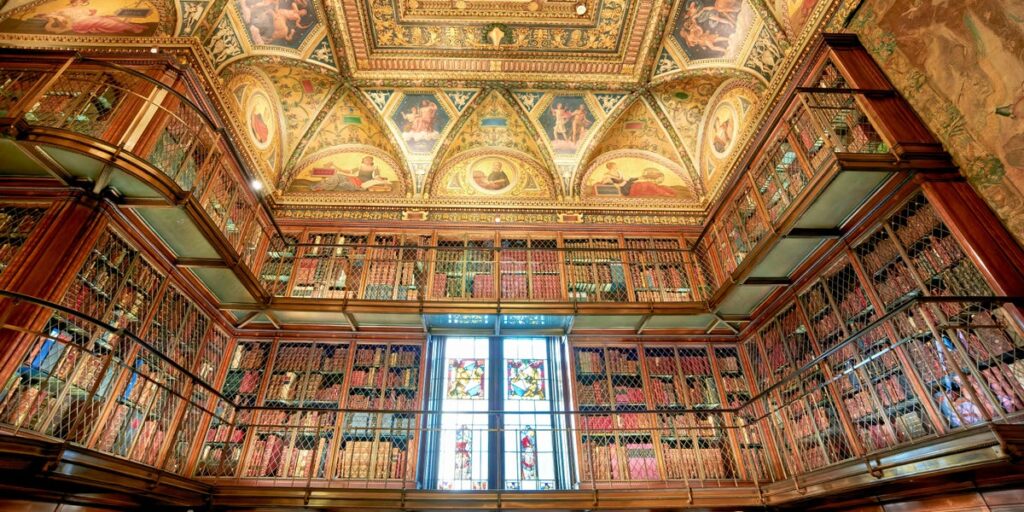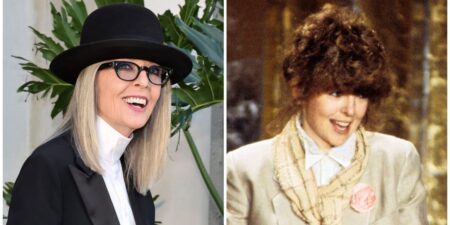HBO’s “The Gilded Age” may be over for the year but, thankfully, the era is inescapable if you’re in the New York area.
A new character added to season three was none other than J. Pierpont Morgan — you may know him as J.P. Morgan. Yes, like the bank.
If his introduction to the show made you curious about the Morgan family, how he made his fortune, and, crucially, how he spent his millions, you need look no further than the Morgan Library and Museum, located in Manhattan.
After Morgan’s death in 1913, his son, Jack, decided to turn his father’s private library into a public library for people to view his father’s extensive collection. It opened in 1924.
The museum, which costs $25 to enter, is actually comprised of three buildings once owned by various members of the Morgan family. The buildings are connected by a large lobby that was constructed in 2006.
The oldest building is the Pierpont Morgan Library, which was completed in 1906. It was built to hold Morgan’s rapidly growing collection of art, antiquities, books, and manuscripts that he spent millions of dollars amassing. Today, it looks exactly as it did when Morgan spent his time there.
The second building is the Annex, which stands on the land that used to be Morgan’s brownstone. It opened in 1928. The third building, now known as the Morgan House, was originally the brownstone owned by Morgan’s son, Jack. It was purchased by the museum in 1989.
Entering the library felt like stepping back to a time when families like the Morgans, Astors, Vanderbilts, and Rockefellers ruled NYC.
Here’s what it’s like to visit the Morgan Library and Museum.
I visited the Morgan Library and Museum, located in the Murray Hill neighborhood of Manhattan.
The museum is open every day (except Mondays) for visitors to take a trip back to the early 20th century.
There are also temporary exhibits inside. From June to September, there’s an exhibit dedicated to Jane Austen that’s included with admission.
J. Pierpont Morgan, a famed Gilded Age figure, commissioned the library in 1902. It was completed in 1906.
You enter the museum through this modern addition that features floor-to-ceiling windows and the museum café. It was built in 2006.
There’s a scale model of the library in this entryway.
There’s also the original brass bell from Morgan’s third yacht, the Corsair. It’s still rung daily to signify closing time.
The section of the museum that houses Morgan’s library is clearly marked.
Even just walking across the threshold felt like entering a time machine. The modern wood and glass was replaced with marble and dark wood.
This rotunda connects to the three rooms open to the public in Morgan’s library.
When visiting the entire museum, you shouldn’t forget to look up. The ceilings in every room are works of art.
The first room I entered was Morgan’s private study.
This ceiling was imported from Italy by architect Charles McKim. It’s believed to have been constructed in the 1500s.
This is Morgan’s desk. Many deals were made in the presence of this desk — Morgan was known as “America’s greatest banker.”
A portrait of Morgan hangs above the fireplace.
Notice the unique walls — it’s not wallpaper, it’s silk damask. The pattern is based on a design made for the Renaissance banker Agostino Chigi.
Morgan collected fragments of Renaissance-era stained glass for years until he had enough to construct windows in his study. Installation took two years.
In the corner of the room is the door to Morgan’s private vault.
The walls of the vault are lined with steel. It’s still the home to some of the rarest books in Morgan’s collection.
After going back through the rotunda, I entered the main event: Morgan’s library.
This room is a book-lover’s dream.
I was overwhelmed by the sheer size, the artistry present in every detail, and the amount of history located in this room.
There are three floors of shelves.
In every corner, there was a piece of art to study.
I spent much of my time looking at all the books and manuscripts on the shelves.
Located in this beautiful binding are the Lindau Gospels, a manuscript from the ninth century.
This is the Stavelot Triptych. It’s thought to contain a piece of the “True Cross,” the cross on which Jesus was crucified.
There are dozens more pieces like that in this library. I could spend hours here.
I also visited the librarian’s office.
While it’s not as large as the library, it’s nothing to scoff at.
The ceiling is covered in murals in the style of an Italian Renaissance painting.
The first librarian at the Pierpont Morgan Library was Belle da Costa Greene.
Greene, born in 1879, was the daughter of Richard T. Greener, the first Black graduate of Harvard.
After her parents separated, Greene, her brother, and her mother began passing as white to avoid racism and segregation.
While working at Princeton, Greene met J.P. Morgan’s nephew, Junius Spencer Morgan, who introduced her to his uncle.
Greene worked at the Pierpont Morgan Library from 1905 until 1948. This fictionalized version of her life is for sale at the gift shop.
My next stops were the temporary galleries. They’re located in what was once J.P. Morgan’s brownstone, which was annexed in 1928.
“A Lively Mind: Jane Austen at 250” was packed with visitors.
The exhibit, which runs through September 14, is a love letter to the “Pride and Prejudice” author’s legacy.
In the museum, a sign pointed to this grille, which has “648 wrought-iron birds, each with a unique beak.” This was added in the ’20s.
I walked upstairs to look at the rest of the museum.
There’s an impressive art gallery on the second floor.
I spotted memorabilia once owned by Edgar Allan Poe, Leonardo da Vinci, and Frédéric Chopin.
My favorite thing about the second floor, though, was the view.
My last stop was, of course, the gift shop. It’s located in the Morgan House, which was once the brownstone of Morgan’s son, Jack.
Of course, there were books for sale. I ended up buying “Sense and Sensibility,” an Austen classic.
My final activity was taking in the museum’s garden, which is open seasonally.
A plaque said the museum had been declared a National Landmark in 1966.
I was able to get a better view of the original exterior of the Pierpont Morgan Library from here.
This ceiling was also not to be missed.
There were also Renaissance statues inside the portico.
The garden itself wasn’t that impressive.
But I was amused that, just a few feet away, modern life continued, even though I felt like I had just gone back 100 years.
Now that “The Gilded Age” is on hiatus, taking a trip to the Morgan Library is a great substitute for immersing yourself in New York gone by.
















